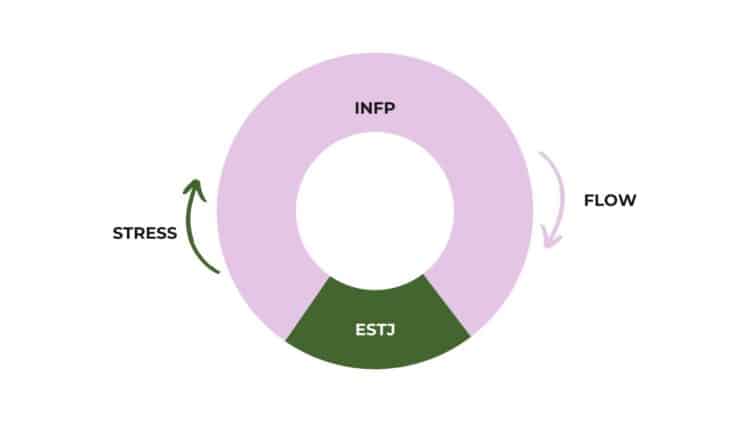
Understanding Flow
Flow or Psychic Energy, as Carl Jung called it, is released when the dominant and inferior functions move together in synchronized harmony. This happens when the dominant function leads but with the inferior as a tool and support.
The state of flow, where we feel energy, motivation, and confidence, can be contrasted with the state of stress, where we think quickly drained, insecure, and negatively motivated. In this case, the inferior function leads to the dominant function. In this case, it can feel as if we are acting against our better wishes. We are doing something we don’t want to do to avoid a negative outcome.
When we avoid our inferior function, it begins to bottle up like a dam, eventually starting to overflow to the point where repressed negative feelings explode like a tidal wave, washing over us. When we are not in flow, we may be in a state of overcompensation, avoidance, or surrendering. The state of surrendering is when the dam explodes and the stress of the inferior function becomes impossible to avoid. The state of overcompensation is when we avoid using our inferiority and, instead, try to actively move against or away from these feelings. Finally, the state of avoidance is when we try to focus on other things to avoid the use of the inferior function.
For example, an INFP might in a state of avoidance, engage in artistic or creative activities that get them to focus on other things than work. During overcompensation, they may drastically step up their emotional work, counsel, or spend even more time daydreaming so that they don’t have to face ESTJ demands of work, productivity, and completing projects. And during surrender, the INFP may quit or give up on artistic pursuits or abandon their dreams, as they give in to professional demands and expectations.
Getting in touch with your values
Many people find it hard to find their personality type. But finding your type shouldn’t be an abstract, contemplative activity you do at the safe confines of your bedroom. You find your personality type by formulating a hypothesis about what kind of life you want to live and going out and testing that theory in reality.
If you are introverted, you should be actively thinking about how to preserve your energy and maintain healthy boundaries. If you are an iNtuitive type, you should be looking at ways to realise a creative life. If you are a Thinking type, you should be formulating challenges for yourself to make sure that you are intellectually stimulated.
Finding your Flow State
When people are able to properly tune into themselves and to live life the way they want to, and they can do so confidently and in a secure and comfortable way, they enter into a healthy state of flow. Stress and anxiety is reduced, and there is a greater feeling of joy and a stronger sense of inner motivation.
We live in a society full of morals and values. We are all told how to act, how to live, and what to do, by our parents, teachers, and by society, but everyone has their own individual values. Just as everyone has their strengths and their core values and things that are inherently great about them, we all have weaknesses and things we struggle with.
If you try too hard to please other people, or to improve your weaknesses, you can end up controlled by stress. We live in a world where everyone tries hard to present a perfect image to the world, but we all end up mediocre.
Going from a Turbulent to an Assertive Type
With the 16 Personalities and the Big 5, came more research into Neuroticism and the so called Turbulent and Assertive subtypes. I’ve found that people that have been able to hone in to their personality type and live according to their values and interests, are more Assertive, while people that try to be someone else, experience higher neuroticism.
This website covers resources to help you discover your personality type, so explore your personality type and see what you can do to find your Flow State and become an Assertive personality type.
Browse all categories
- 16 Personalities
- Archetypes
- Artificial Intelligence
- Astrology
- Big5
- Body language
- Career
- Carl Jung
- Celebrities
- Challenges
- Cognitive Functions
- Cognitive Functions
- Creativity
- Dark Triad
- Digital Nomads
- DiSC
- ENFJ
- ENFJ
- enfp
- ENFP
- ENFP
- Enneagram
- Enneagram
- ENTJ
- ENTJ
- ENTP
- ENTP
- Erik Thor
- ESFJ
- ESFJ
- ESFP
- ESFP
- ESTJ
- ESTJ
- ESTP
- ESTP
- Extroversion
- Feeling
- Feminism
- Fiction
- Gallery
- Giftedness
- Happiness
- Health
- Hero's Journey
- How To
- HSP – Highly Sensitive People
- Idealist
- INFJ
- INFJ
- INFP
- INFP
- Intelligence
- INTJ
- INTJ
- INTP
- INTP
- Introversion
- Intuition
- ISFJ
- ISFJ
- ISFP
- ISFP
- ISTJ
- ISTJ
- ISTP
- ISTP
- Judging
- Language
- Memes
- Memory
- Minimalism
- Music
- Neurodivergence
- Neuroplasticity
- News
- Personality tests
- Personality Types
- Philosophy
- Podcasts
- Politics
- Polymathematics
- Psychology
- Quiz
- Relationships
- Spiral Dynamics
- Stereotypes
- Stories
- STP
- Subtypes
- The Netherlands
- Uncategorized
- Videos
- Visual Typing
- YouTube Videos
Common topics
16 Personalities Archetypes Astrology Big5 Body language Cognitive Functions dating enfj ENFP enneagram ENTP Erik Thor ESFJ ESFP estp Extroversion feeling Fiction health IFTTT INFJ infjs infp infps INTJ INTP Introversion Intuition ISFP Judging MBTI perceiving Personal Growth Personality personality tests Personality Types psychology Relationships sensing stereotypes stress subtypes Thinking YouTube YouTube Videos

